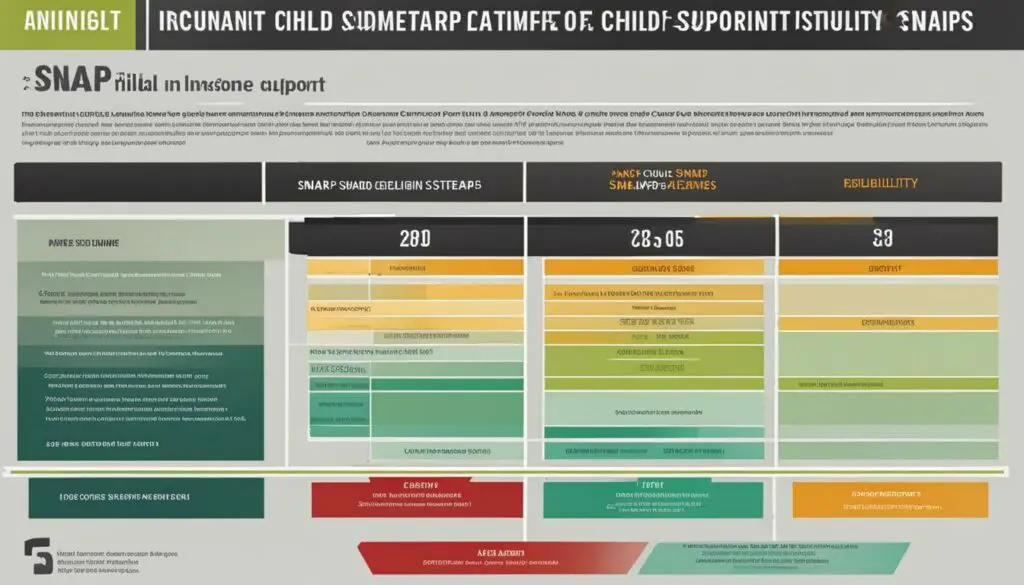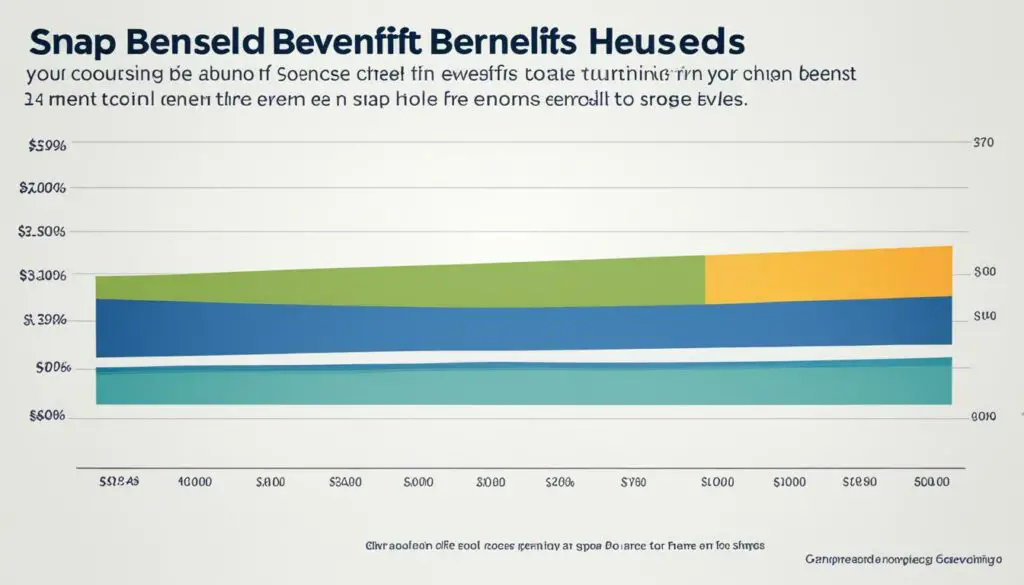Originally posted on December 20, 2023 @ 4:27 pm
Child support payments can impact eligibility for the Supplemental Nutrition Assistance Program (SNAP), commonly known as food stamps. SNAP benefits are based on income and certain expenses, with gross and net income thresholds determining eligibility.
When calculating SNAP eligibility, child support is considered as part of the income calculation. It is important to note that SNAP benefits are adjusted annually to account for inflation. It is crucial for parents to understand how child support affects their eligibility for public assistance.
Table of Contents
Key Takeaways:
- Child support payments can affect eligibility for SNAP benefits.
- Gross and net income thresholds are used to determine SNAP eligibility.
- Child support is considered as part of the income calculation for SNAP.
- SNAP benefits are adjusted annually to account for inflation.
- Understanding the impact of child support on SNAP eligibility is crucial for making informed decisions.
Snap Eligibility Requirements

To be eligible for SNAP benefits, households must meet specific income guidelines and asset limits. These requirements ensure that assistance is provided to those who need it most. Let’s take a closer look at the eligibility criteria:
Income Guidelines
Income plays a crucial role in determining SNAP eligibility. The program considers both gross and net income when assessing eligibility. Gross income refers to the total income before deductions, while net income is the amount after deductions.
Generally, a household’s gross monthly income must be at or below 130 percent of the poverty line to qualify for SNAP benefits. The poverty line varies based on family size and location.
For example, a family of four residing in the contiguous United States must have a gross monthly income at or below $2,793 to meet the income guidelines for SNAP eligibility.
The table below provides an overview of the maximum gross monthly income limits for SNAP eligibility based on family size:
| Family Size | Maximum Gross Monthly Income |
|---|---|
| 1 | $1,383 |
| 2 | $1,868 |
| 3 | $2,353 |
| 4 | $2,838 |
| 5 | $3,323 |
Note: The above figures are based on the 2021 Federal Poverty Guidelines and may be subject to change. Please consult the official SNAP website for the most up-to-date income guidelines.
Asset Limits
In addition to income, SNAP also considers the household’s assets. These assets include cash, bank accounts, vehicles, and more. However, certain assets are exempt from consideration, such as the primary residence and personal belongings.
The asset limits vary based on household composition. Generally, households with elderly or disabled members have higher asset limits compared to households without them.
Here is an example of the asset limits based on household composition:
| Household Composition | Asset Limit |
|---|---|
| One person | $2,250 |
| Two or more people | $3,750 |
| Households with an elderly or disabled member | $3,750+ |
These asset limits help ensure that SNAP benefits target those in need while also considering the unique circumstances of each household.
With these eligibility requirements in mind, households can determine their eligibility for SNAP benefits and access the assistance they need to secure food for their families.
What Counts as Income for SNAP?

When determining eligibility for SNAP benefits, all cash income sources are taken into consideration. This includes both earned income (before payroll taxes) and unearned income. Let’s take a closer look at the different types of income that SNAP considers:
Earned Income:
Earned income refers to the money you receive from working or self-employment. It includes wages, salaries, tips, and any other income you earn through employment. SNAP calculates your eligibility based on your earned income before deducting payroll taxes. For example, if you earn $1,000 per month but have $100 deducted for taxes, SNAP will consider your income as $1,000.
Unearned Income:
Unearned income includes various sources of income that you receive without actively working. Examples of unearned income include:
- Cash assistance: This includes temporary cash assistance, such as Temporary Assistance for Needy Families (TANF) payments.
- Social Security: This includes retirement benefits, disability benefits, and Supplemental Security Income (SSI).
- Unemployment insurance: If you are receiving unemployment benefits, they are considered as unearned income.
- Child support: Payments received from the noncustodial parent as child support are counted as unearned income.
For the purpose of determining SNAP eligibility, the total income from these sources is considered. It is important to note that some forms of income, such as tax refunds and certain benefits and assistance programs, may not be counted as income for SNAP purposes.
“SNAP counts all cash income sources, including both earned income (before payroll taxes) and unearned income, such as cash assistance, Social Security, unemployment insurance, and child support.”
Here is an example of how different income sources are combined to determine SNAP eligibility:
| Income Source | Monthly Amount |
|---|---|
| Earned Income (before taxes) | $1,500 |
| Unemployment Insurance | $250 |
| Social Security | $800 |
| Child Support | $200 |
| Total Income: | $2,750 |
In this example, the household’s total income from various sources is $2,750 per month, which is considered for determining SNAP eligibility.
How Child Support Affects SNAP Eligibility

When determining eligibility for SNAP benefits, child support payments are included as part of the income calculation. If a parent receives child support, it is considered as income and taken into account when assessing eligibility for SNAP benefits. However, if child support payments are not being received, they are not considered as income in the eligibility determination process.
Conversely, if a parent pays child support, those payments are deducted from their income when determining SNAP eligibility. This deduction helps to offset the financial obligation of paying child support and may increase the household’s eligibility for SNAP benefits.
Understanding how child support affects SNAP eligibility is crucial for individuals and families seeking assistance. Here is a breakdown of how child support can impact SNAP eligibility:
- If you receive child support: The child support payments you receive from the other parent are considered as part of your income for SNAP eligibility assessment.
- If you do not receive child support: If you are entitled to child support but are not receiving payments, the child support is not included as income for SNAP eligibility purposes.
- If you pay child support: The child support payments you make can be deducted from your income when determining eligibility for SNAP benefits. This deduction helps lower your overall income and may increase the chances of qualifying for SNAP.
It is important to provide accurate information about child support payments when applying for SNAP benefits. Any changes in child support amounts should be reported promptly to ensure that the benefits received reflect the current income and financial situation.
| Scenario | Treatment of Child Support |
|---|---|
| If you receive child support | Child support payments are included as part of your income for SNAP eligibility assessment. |
| If you do not receive child support | Child support is not considered as income for SNAP eligibility purposes. |
| If you pay child support | Child support payments are deducted from your income when determining eligibility for SNAP benefits. |
It’s essential to be aware of how child support impacts SNAP eligibility as it can affect the amount of benefits you receive. Make sure to consult with the appropriate agencies or seek legal advice if you have any questions about child support and its implications on SNAP eligibility.
Child Support and Public Assistance

When a single parent applies for public assistance, such as SNAP benefits, the state may initiate a child support case, even if the parent does not request it. The state prefers children to receive child support rather than public assistance whenever possible. If no child support order is in place and public assistance is requested, the state will generally file for child support on behalf of the custodial parent. The child support order may result in the majority of the child support funds being reimbursed to the government agency.
It is important for single parents seeking public assistance to understand the relationship between child support and their eligibility for SNAP benefits. By encouraging child support payments, the state aims to reduce the reliance on public assistance and ensure that children receive the financial support they need. The child support order can help redirect support funds toward the child’s well-being rather than relying solely on government assistance.
Here is an example of how child support may impact eligibility for SNAP benefits:
| Scenario | Child Support Received | SNAP Eligibility |
|---|---|---|
| Parent receives child support | Yes | Child support is calculated as part of the household income and may affect SNAP eligibility. |
| Parent receives no child support | No | Child support is not considered as part of the household income for SNAP eligibility assessment. |
| Parent pays child support | Yes | Child support payments made by the household are deducted from the income for SNAP eligibility assessment. |
It is important for single parents to be aware of their rights and obligations regarding child support when applying for public assistance. Consulting with a family law attorney can provide guidance on navigating the complexities of child support and its impact on eligibility for government assistance programs.
Child Support and Government Assistance

When it comes to child support and government assistance, there are important considerations for parents. Government assistance programs, such as SNAP benefits, can have an impact on informal child support arrangements and the flexibility they offer.
Parents need to weigh the potential benefits and drawbacks of filing for child support versus applying for public assistance. One key factor to consider is that child support payments can be included as income, which may affect eligibility for government assistance. This means that receiving child support could potentially impact the amount of benefits a parent is eligible to receive.
It is crucial for parents to evaluate their individual circumstances and make informed choices. Seeking guidance from a family law attorney can provide valuable insight and support in navigating the complexities of child support and government assistance programs.
Child Support or Government Assistance: Weighing Your Options
When deciding whether to pursue child support or apply for public assistance, parents should carefully assess their income threshold and the potential impact on their financial situation. Here are some factors to consider:
1. Informal Arrangements: Informal child support arrangements can provide flexibility and convenience for both parents. However, it’s important to understand how these arrangements may be affected by government assistance programs.
2. Income Threshold: Government assistance programs often have income thresholds that determine eligibility. Child support payments can be considered as income, potentially affecting your eligibility and benefit amounts.
3. Individual Circumstances: Every parent’s situation is unique, and there is no one-size-fits-all answer. Consider your specific income, expenses, and needs when evaluating the impact of child support and government assistance.
Advantages and Disadvantages of Child Support and Government Assistance
Both child support and government assistance programs have their advantages and disadvantages. Here’s a breakdown to help you make an informed decision:
| Child Support | Government Assistance |
|---|---|
| Provides additional income to support the child’s needs. | Offers assistance with food, healthcare, and other essential needs. |
| Flexibility in how child support funds are used. | Structured program with specific guidelines and requirements. |
| Payment amount may vary depending on the non-custodial parent’s income. | Benefits are determined based on income thresholds and household size. |
| No income threshold for receiving child support. | Income threshold determines eligibility for government assistance. |
| Child support may not cover all expenses associated with raising a child. | Government assistance programs can help cover essential expenses but may have limitations. |
By carefully evaluating these factors and understanding the potential impact on their financial situation, parents can make an informed decision about pursuing child support or government assistance.
Child Support and Household Size

When it comes to determining eligibility for SNAP benefits, the size of the household and child support payments are crucial factors. SNAP takes into account the number of individuals living in the household, including children, to calculate the benefits. Adding a child through birth or adoption can lead to an increase in household size, which may result in higher SNAP benefits.
Understanding how child support and household size impact SNAP benefits is essential for individuals and families seeking assistance. It’s important to accurately report the number of household members and any child support payments received or paid to ensure proper evaluation of eligibility.
Tables 1: Household Size and SNAP Benefit Calculation
| Household Size | Maximum Gross Income Limit |
|---|---|
| 1 | $1,383 |
| 2 | $1,868 |
| 3 | $2,353 |
| 4 | $2,839 |
| 5 | $3,324 |
Note: The table above showcases the maximum gross income limits based on household size. The actual calculation for SNAP benefits considers various factors, including deductions and household expenses. It is recommended to consult the official SNAP guidelines or eligibility specialists for accurate benefit estimation.
It’s important to remember that child support payments, whether received or paid, are part of the household’s income calculation for SNAP eligibility assessment. The amount of child support received adds to the household’s income, while child support payments made are deducted from the household’s income to determine the net income for eligibility.
Considering the impact of child support and household size on SNAP benefits can help individuals and families make informed decisions regarding their financial situation and eligibility for government assistance programs.
Child Support and Income Calculation

When determining eligibility for SNAP benefits, child support payments play a crucial role in the income calculation. Whether you receive or pay child support, it directly affects the assessment of your household’s income.
Child support received: If you are receiving child support, the amount you receive is considered as part of your household’s income for SNAP eligibility. The total income, including child support, is taken into account when determining if you meet the income thresholds.
Child support paid: On the other hand, if you are paying child support, those payments are deducted from your income for SNAP eligibility assessment. Deducting the child support payments helps determine the net income, which is used to assess your eligibility for SNAP benefits.
This means that child support, whether received or paid, has a direct impact on the income calculation for SNAP benefits. It is important to accurately report child support payments and amounts to ensure your eligibility determination is accurate.
Below is an example of how child support payments are factored into the income calculation for SNAP benefits:
| Household Income Sources | Amount |
|---|---|
| Employment Income | $1,500 |
| Child Support Received | $300 |
| Total Income | $1,800 |
| Child Support Paid | $200 |
| Net Income | $1,600 |
Note: This is a simplified example and does not reflect actual income or benefit calculations. The actual income calculation for SNAP benefits takes into account various factors, including deductions and allowances.
Understanding how child support affects the income calculation for SNAP benefits is important for accurately assessing your eligibility. It is recommended to consult with a professional or refer to official guidelines to ensure you comply with the income calculation requirements and accurately report child support payments.
Child Support, SNAP Benefits, and Other Programs
Child support payments not only affect eligibility for SNAP benefits but also impact other government assistance programs such as Temporary Assistance for Needy Families (TANF) and Medicaid. These programs consider the income from child support when determining the household’s eligibility. It is crucial for parents to understand the potential impact before applying for public assistance.
Child support is a significant factor in determining eligibility for TANF, a program that provides financial assistance to low-income families. The income received from child support may affect the household’s income level, which is considered when evaluating eligibility for TANF benefits. Parents should carefully assess the financial implications of child support on TANF eligibility.
Medicaid, a program that offers healthcare coverage to low-income individuals and families, also takes child support income into account when assessing eligibility. The income threshold for Medicaid may vary depending on the state and household size. Parents should be aware of how child support payments can impact their eligibility for Medicaid.
Child Support, TANF, and Medicaid: A Comparison
Understanding the interaction between child support, TANF, and Medicaid is essential for making informed decisions. Here’s a comparison of the three programs:
| Program | Eligibility Criteria | Impact of Child Support |
|---|---|---|
| TANF | Low-income families with dependent children | Child support income may affect eligibility and benefit amount |
| Medicaid | Low-income individuals and families | Child support income may impact income threshold for eligibility |
| Snap Benefits | Low-income individuals and families | Child support income is considered in calculating eligibility and benefit amount |
It is important for parents to consider the potential impact of child support on their eligibility for these programs. Consulting with a family law attorney or seeking guidance from relevant government agencies can provide valuable insights and help parents make informed decisions regarding public assistance.
Child Support and Alternative Benefits
When it comes to navigating the complexities of public assistance, parents often find themselves at a crossroads between filing for child support or applying for alternative benefits. Evaluating the advantages of each option is crucial in making informed decisions that best suit their unique circumstances.
Depending on the specific situations, receiving child support may provide a higher income compared to public assistance programs. However, it is important to consider the potential implications of this choice, as it may render the household ineligible for certain benefits.
Understanding the relationship between child support and alternative benefits is key. By weighing the pros and cons of each option, parents can determine the most suitable path to secure the financial support they need.
Receiving Child Support: A Potential Income Boost
For some parents, receiving child support can be a significant source of income that surpasses what they would receive through public assistance programs. Child support payments provide a consistent and predictable stream of income, ensuring financial stability for the custodial parent and the child.
“Child support offers a reliable source of income that is specifically designated for the child’s needs, such as education, healthcare, and other expenses. This can help alleviate the reliance on public assistance while ensuring the child’s well-being.”
By receiving child support, parents have increased control over how the funds are allocated to meet the child’s needs, providing a sense of empowerment and financial independence.
Ineligible for Certain Benefits
It is essential to consider that the income from child support may impact eligibility for certain public assistance programs. The amount received through child support can push the household’s income above the threshold, resulting in disqualification from receiving benefits.
Furthermore, alternative benefits programs often have specific income limits that households must meet to qualify. Receiving a higher income through child support may put the household beyond the income threshold, making them unable to access certain programs.
Making an Informed Decision
When deciding between child support and alternative benefits, parents should evaluate their income level and the potential benefits and drawbacks of each option. Taking into account factors such as income stability, control over funds, and the impact on eligibility for other programs can guide parents in making the most favorable choice.
Consulting with legal professionals, such as family law attorneys specializing in child support, can provide valuable insights and guidance tailored to individual circumstances. These professionals can help parents understand the legal implications and navigate the complexities of child support and public assistance programs.
Conclusion
When it comes to determining eligibility for SNAP benefits, child support payments play a crucial role. Also known as food stamps, SNAP benefits consider the income from child support when calculating a household’s eligibility and the amount of benefits they may receive. It is important for parents to understand how child support impacts their eligibility for public assistance and make informed decisions based on their individual circumstances.
Consulting with legal professionals can provide valuable guidance on navigating the complexities of child support and government assistance programs. They can help parents understand the income guidelines and SNAP eligibility requirements, ensuring they make informed choices that align with their financial situation.
Additionally, utilizing available resources, such as official SNAP websites and informational materials, can provide further clarity on how child support affects eligibility for food stamps. Being well-informed about the relationship between child support and public assistance programs is crucial for parents in order to maximize the benefits they are eligible for and ensure the well-being of their families.
FAQ
What are the income guidelines for child support and food stamps?
Child support payments can impact eligibility for the Supplemental Nutrition Assistance Program (SNAP), commonly known as food stamps. SNAP benefits are based on income and certain expenses. Gross and net income thresholds are used to determine eligibility, and child support is considered as part of the income calculation. Assets are also taken into account, with different limits for households with and without elderly or disabled members.
What are the eligibility requirements for SNAP?
To be eligible for SNAP benefits, a household’s gross monthly income generally must be at or below 130 percent of the poverty line. Net income, which is the household income after deductions, must also be at or below the poverty line. Assets, such as bank accounts, are considered, with limits set based on household composition. The asset limits are higher for households with elderly or disabled members.
What counts as income for SNAP?
SNAP counts all cash income sources, including both earned income (before payroll taxes) and unearned income, such as cash assistance, Social Security, unemployment insurance, and child support. The total income from these sources is considered for determining SNAP eligibility.
How does child support affect SNAP eligibility?
Child support payments are included as income when calculating eligibility for SNAP benefits. If a parent receives child support, it is calculated as part of their income. However, if child support payments are not being received, they are not considered as income. On the other hand, if a parent pays child support, those payments are deducted from their income for SNAP eligibility assessment.
How does child support impact public assistance?
When a single parent applies for public assistance, such as SNAP benefits, the state may initiate a child support case, even if the parent does not request it. The state prefers children to receive child support rather than public assistance whenever possible. If no child support order is in place and public assistance is requested, the state will generally file for child support on behalf of the custodial parent. The child support order may result in the majority of the child support funds being reimbursed to the government agency.
Can child support affect other government assistance programs?
Yes, child support can impact eligibility for other government assistance programs, including Temporary Assistance for Needy Families (TANF) and Medicaid. The income from child support may affect the household’s eligibility for these programs, and parents should consider the potential impact when making decisions about applying for public assistance.
How does child support affect household size for SNAP benefits?
Child support and the size of the household are factors that can affect eligibility for SNAP benefits. The number of individuals living in the household, including children, is considered when determining SNAP benefits. The addition of a child through birth or adoption may increase the household size and potentially result in higher benefits.
How is child support factored into income calculation for SNAP benefits?
Child support payments, whether received or paid, are factored into the income calculation for SNAP benefits. The amount of child support received is considered as part of the household’s income, while child support payments made by the household are deducted to determine the net income for eligibility assessment.
Can child support affect eligibility for other assistance programs besides SNAP?
Yes, child support can impact eligibility for other government assistance programs in addition to SNAP benefits. This includes programs like Temporary Assistance for Needy Families (TANF) and Medicaid. The income from child support may affect the household’s eligibility for these programs, and parents should consider the potential impact when making decisions about applying for public assistance.
Should I choose child support or public assistance based on my situation?
Parents should evaluate whether filing for child support or applying for public assistance is more advantageous for their situation. Depending on the specific circumstances, receiving child support may provide more income than public assistance, potentially making the household ineligible for certain benefits. Understanding the relationship between child support and alternative benefits is crucial for making informed decisions.
How does child support impact SNAP eligibility?
Child support plays a significant role in determining eligibility for SNAP benefits, also known as food stamps. The income from child support is considered when calculating eligibility and benefits for the program. It is essential for parents to understand the impact of child support on public assistance and make informed choices based on their individual circumstances. Consulting with legal professionals and utilizing available resources can help navigate the complexities of child support and government assistance programs.
Source Links
- https://www.cbpp.org/research/food-assistance/a-quick-guide-to-snap-eligibility-and-benefits
- https://www.joinproviders.com/state/louisiana/food-stamps-eligibility-income-limits/
- https://www.verywellfamily.com/child-support-and-government-assistance-2997967
See also:
Leave a Reply